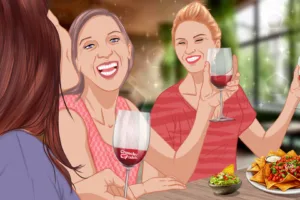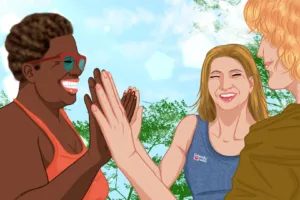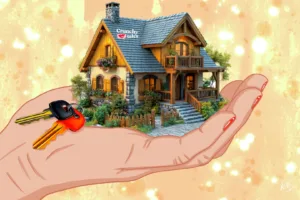Making Friends After 50: An Awkward Journey Worth Trying
Making friends after the age of 50 can be exciting and rewarding, but most of the time very challenging. It doesn’t matter how many clubs, organizations or communities you join, you still have the feeling that it’s just not enough.
“We’ve all heard the well-meaning advice: join a club, pick up a hobby, use a site like MeetUp“, says podcaster and longevity coach, Nicole Christina, “But it’s a lot more complicated, otherwise there wouldn’t be so many lonely people“.
In this article, she will share her journey and feelings on the road to making new friends as a mature woman. Whether you’re retired, an empty nester, or simply looking to expand your social circle, one thing is certain: if you’re ready to embark on a new chapter of your social life to meet like-minded people, you have to get out of your comfort zone and see what happens.
![]()
Friendships matter, after 50 even more
Remember when we were kids and it was easy to make friends? I remember going to summer camp and making boondoggle keychains next to a girl who would become my good friend. The basis of our friendship? We both loved cats, crafts and jumping rope. We started bringing each other little gifts every day. It was spontaneous and easy.
Fast forward 50 years. I’ve recently moved to a new town–just far enough that my friends don’t make the trip often. Gone are the days when I would run up the street in my transitional pyjamas to see if my friend Mary’s sourdough mother was looking active.
Taking a quick impromptu walk with her is over. My old friends and I have to plan our get-togethers and it takes more effort. I see them weekly at tennis, but it’s not the same.
So I’m finding myself wishing I had a group of women I feel connected to. The kind of friendship that includes getting a text like “I bought too many apples. I’m dropping some off in a minute.”
Even though I have a lot of hobbies and a job that keeps me busy, that yearning for companionship is real. Friendship fills me up in a way that is different from the satisfaction I feel with my partner or at work. And lately, I’m feeling the longing for that connection.
The importance of social connections in older adults
The importance of friends in midlife cannot be overstated. Friends can strengthen our immune system, help us recover more quickly from illness, sharpen our memory and even help us live longer. Research suggests that having close ties to friends, and participating in meaningful social activities, may help people maintain their thinking skills better in later life and slow down cognitive decline.
A study published in the British Medical Journal found that men and women who reported having 10 or more friendships at age 45 had significantly higher levels of psychological well-being at age 50 than those with fewer friends. Maintaining friendships may even be more important as we get age, according to researchers at Michigan State University who found that among older adults, friendship quality often predicts health more so than the quality of any other relationship.
Meaningful connections also help keep loneliness and isolation at bay. We all are aware that we’re in a loneliness epidemic, and that loneliness takes both an emotional toll as well as a physical one. As mammals, we’re meant to travel in a pack. Living out of alignment with our biology doesn’t work out well for us. Friends are the ballast that helps us through the rough patches. They are the soft places to land when we’ve been treated unkindly.
Without friends, we have no buffer from the suffering that is part of life. Life is just harder. Friends make us more resilient and happier. There’s a sweetness that happens when we spend time with people we’re simpatico with. Even though I enjoy spending time alone, sharing the beauty of a wooded trail or the delight in the farmer’s market elevates the experience.
Romantic partners can’t replace friendships
Unfortunately, friendship ranks far below romantic love in our culture, which is considered the ultimate prize. You are no doubt familiar with the common phenomenon when your friend finds a new love and you become invisible. Some consider friendships a placeholder until they find their life partner.
But relying on a partner to fill all of our emotional needs is asking for trouble. It’s a burden for them, and usually a disappointment for us. On the other hand, having a group of friends allows us to nurture all parts of ourselves. Some friends are best for dog walking, others for processing difficult situations, and others shine on a thrift store outing. Diversifying our relationships adds richness to our lives.
When making friends requires real effort
Although it might be scary, sometimes putting yourself out there more is necessary. Some structural problems get in the way of making friends easily as we age. We’re no longer living in a community. Places of spiritual worship are experiencing the lowest attendance in decades. We live separated from our families in single-family homes, driving our own cars. We’re busy beyond belief and might not have the energy to put into making and maintaining friendships. It’s a real commitment.
According to the online magazine The Conversation, it takes about 50 hours to make casual friends. And to make a casual friend into a close friend? More than 200 hours. Many of us still believe that finding friends should happen organically and easily as it did when I was in summer camp. That happens, but more often it takes initiative.
In addition to the time commitment, taking the initiative and asking someone for coffee is out of most of our comfort zones. At this age, we have decades of lived experience that includes complicated and painful relationships with loved ones. We may have adopted beliefs that we are inadequate, unlovable or broken in some way.
Most of us carry some fear that if people got to know us they wouldn’t like us. It seems to be the human condition to feel unworthy. Even though Brene Brown’s message of the importance of vulnerability resonates with many of us: being vulnerable in everyday life is harder than it sounds. It’s scary to make the first move.
Expanding your social circles after 50: the raw truth
Life comes calling with its multiple demands, and friendships evolve as a result. I’ve been attending different events in my new town on my mission to widen my circle of friends.
I’ve been attending a local church a few times, even though the doctrine does not fully resonate with me, joined in on a drum circle once, and attended an arts charity event. I’ve put a call out for pickleball players on the town’s Facebook page, and I plan to volunteer to serve meals at Thanksgiving. I’ve had some success, but it’s been slower than I had hoped.
Not even to mention making friends out of your age groups. There are often misconceptions, stereotypes, and communication gaps that hinder meaningful connections. But it doesn’t have to be this way. With the right mindset and approach, forging relationships across generations can be a rewarding experience for all involved. It’s up to us to break down barriers and often this involves active listening and small gestures of kindness.
Recently I picked up the book “Platonic” by psychologist and researcher Marisa G. Franco Ph.D. Now I understand why I have only met with mixed success; one of the main takeaways is the importance of showing up again and again to the same places. The one-and-done events don’t lend themselves to making friends. We need repeated exposure.
“Many of us see ourselves as passive agents of our social worlds, waiting for someone else to reach out to us and introduce themselves. We must, instead, embrace the idea that we are in more control of our social worlds than we think. The more intentional we are about connecting with others, the more we benefit”, explains Franco.
Becoming a regular at your favourite place, while showing empathy and curiosity in understanding the experiences and perspectives of others, might be key to forging new connections. But still, it requires courage and determination. Some days I feel more brave than others.
So, how can we keep showing up and making new attempts? According to Marisa G. Franco, we should assume people like us. Basically, if we expect acceptance, we will behave warmly, which in turn will lead other people to accept us; if we expect rejection, we will behave coldly, which will lead to less acceptance.
That’s a challenge for all of us who have experienced the wear and tear of difficult relationships over the decades. But I love the optimism behind it, and it’s a great place to start.
We might not gain a new best friend in midlife, but finding friends with different interests in your life, at different stages, can be possible and truly rewarding.
How have you made friends in later life? How many friends is enough? Are they different kinds of friends than when you were younger?
Like this post? Support Us or Sign up to our newsletter to get more articles like this delivered straight to your inbox!






